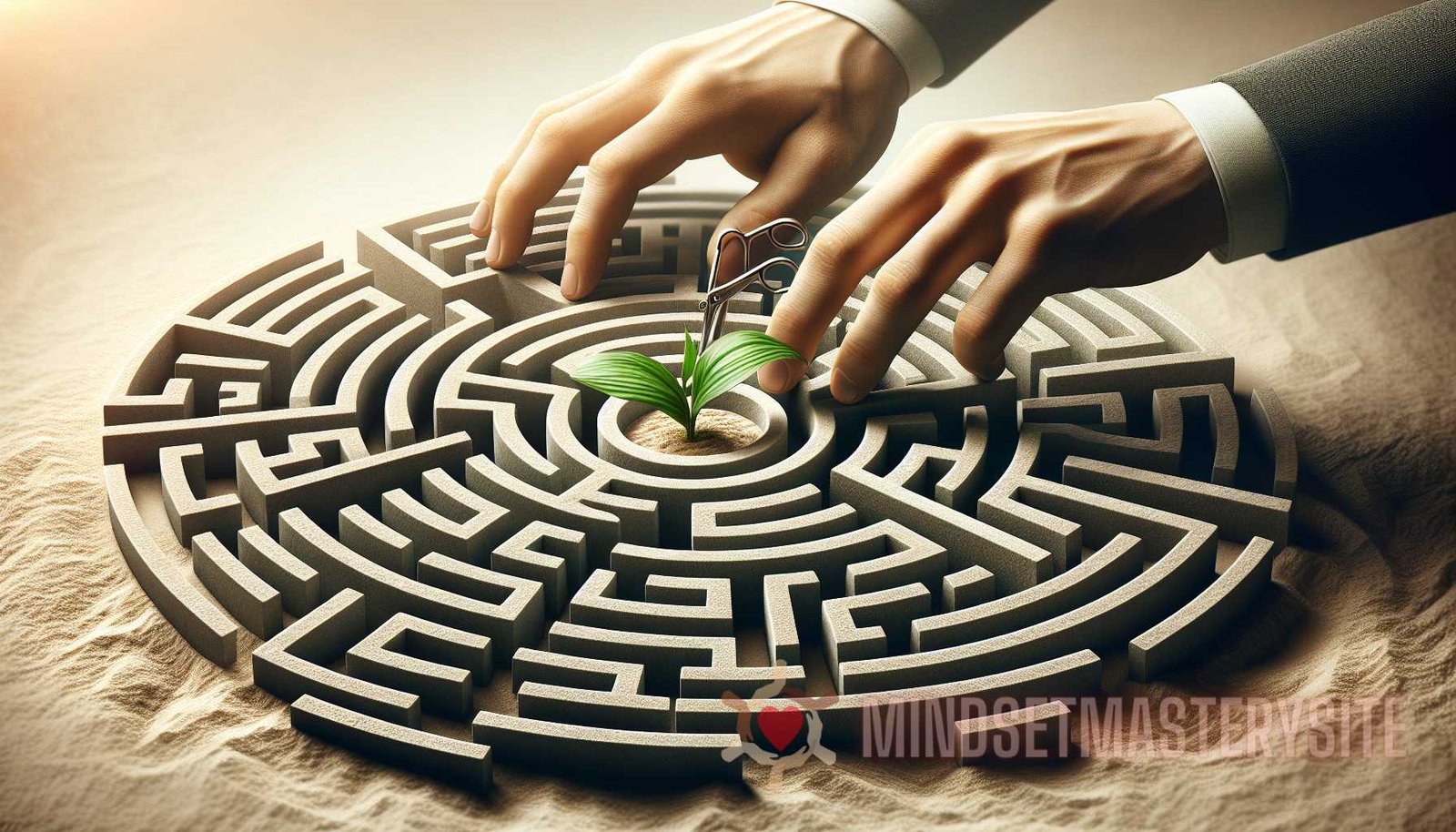Introduction
Embracing challenges is a fundamental aspect of developing a growth mindset, and it is often the key to achieving success in various areas of life. Having a growth mindset means believing that abilities, intelligence, and skills can be developed through dedication, effort, and hard work. It is the opposite of having a fixed mindset, which is characterized by the belief that our qualities and talents are fixed and cannot be improved.
In this comprehensive guide, we will explore how embracing challenges and cultivating a growth mindset can lead to success. We will delve into the science behind the growth mindset, understand its benefits, and explore practical strategies to adopt this mindset in different aspects of life. Whether you are striving for personal growth, professional development, or academic success, understanding and embracing the growth mindset can be a game-changer.
What is a Growth Mindset?
The concept of the growth mindset was popularized by psychologist Carol S. Dweck in her book “Mindset: The New Psychology of Success.” Dweck describes a growth mindset as the belief that abilities and qualities can be developed and improved through persistent effort and learning. Individuals with a growth mindset see challenges, failures, and setbacks as opportunities for growth and learning, rather than indications of their limitations.
On the other hand, individuals with a fixed mindset believe that their abilities and qualities are predetermined and cannot be changed or improved. They tend to avoid challenges, fear failure, and feel discouraged or threatened by feedback or criticism.
The Science behind the Growth Mindset
Research in neuroscience and psychology has provided compelling evidence for the effectiveness of adopting a growth mindset. Studies have shown that the brain is incredibly malleable and adaptable, with the ability to form new connections and change throughout life. This phenomenon is known as neuroplasticity.
When individuals with a growth mindset face challenges, their brains develop new neural connections, allowing them to learn and improve. This process occurs through the repetition of tasks, deliberate practice, and focused effort. Over time, these new connections strengthen, leading to improved performance and mastery of skills.
In contrast, individuals with a fixed mindset tend to avoid challenges and opt for tasks that they are already proficient in. As a result, they miss out on valuable opportunities for growth and tend to plateau in their abilities.
The Benefits of a Growth Mindset
The adoption of a growth mindset can have numerous benefits in various areas of life. Here are some of the key advantages:

- Increased Resilience: Individuals with a growth mindset are more resilient in the face of challenges and setbacks. They see failure as a temporary setback and an opportunity to learn and grow, rather than a reflection of their worth or abilities. This resilience allows them to persevere through difficult times and bounce back stronger.
- Improved Performance: Embracing challenges and practicing a growth mindset leads to improved performance in academic, professional, and personal pursuits. By believing in their ability to grow and develop, individuals with a growth mindset are more likely to put in the effort required to achieve their goals.
- Increased Motivation and Persistence: Individuals with a growth mindset are intrinsically motivated to learn and improve. They see effort as necessary for growth and development, and they are more likely to persist in the face of obstacles. This motivation and persistence are key factors in achieving long-term success.
- Better Problem-Solving Skills: Adopting a growth mindset enhances problem-solving skills. When faced with challenges, individuals with a growth mindset are more likely to approach them with a solution-oriented mindset, seeking out creative strategies and alternative approaches. This flexibility and adaptability contribute to better problem-solving abilities.
- Enhanced Relationships: The growth mindset can have a positive impact on relationships, both personally and professionally. Individuals with a growth mindset are more open to feedback and criticism, viewing them as opportunities for improvement. They are also more supportive and encouraging towards others, fostering a collaborative and growth-oriented environment.
Embracing Challenges to Cultivate a Growth Mindset
Recognizing Fixed Mindset Triggers
Before we can embrace challenges and adopt a growth mindset, it is essential to identify the triggers and beliefs that are indicative of a fixed mindset. Some common fixed mindset triggers include:
- Fear of Failure: Individuals with a fixed mindset are often driven by a fear of failure. They believe that failure is a reflection of their limitations rather than a normal part of the learning process.
- Avoidance of Challenges: Fixed mindset individuals tend to avoid challenges and tasks that they perceive as difficult or out of their comfort zone. They prefer to stick with what they are already proficient in, fearing that they may fail or be exposed as inadequate.
- Defensiveness: Fixed mindset individuals are more likely to become defensive when faced with criticism or feedback. They view feedback as a personal attack rather than an opportunity for growth and improvement.
- Comparison with Others: Individuals with a fixed mindset often compare themselves to others and believe that their abilities are fixed and cannot be improved. They may feel threatened or discouraged when others outperform them.
By being aware of these fixed mindset triggers, we can consciously work towards cultivating a growth mindset.
Embracing Challenges and Viewing Failure as Feedback
One of the key aspects of embracing challenges is shifting our perception of failure. Rather than seeing failure as a reflection of our limitations, we can view it as feedback and an opportunity for growth and improvement. Here are some strategies to help us embrace challenges and learn from failure:
- Adopt a Growth-Oriented Perspective: By consciously adopting a growth-oriented perspective, we can reframe challenges and failures as opportunities for learning and improvement. Recognize that setbacks are a natural part of the process and that success often comes after multiple attempts and iterations.
- Celebrate Effort and Progress: Instead of solely focusing on outcomes and results, celebrate the effort and progress made along the way. Recognize that progress, regardless of its magnitude, is a step towards growth and development.
- Reflect and Learn from Failure: Take the time to reflect on failures and setbacks. Identify the lessons learned and the areas for improvement. Use this feedback to adjust your approach and develop new strategies for future challenges.
- Set Realistic Goals: Break down big goals into smaller, more manageable tasks. By setting realistic and achievable goals, we can avoid becoming overwhelmed and maintain a sense of progress and motivation.
- Practice Self-Compassion: Be kind and compassionate towards yourself when facing challenges and setbacks. Treat yourself with the same empathy and understanding that you would offer to a close friend. Self-compassion allows us to bounce back from failures and continue on our path towards growth and success.
Cultivating a Growth Mindset in Different Areas of Life
The growth mindset is applicable to various areas of life, including academics, professional pursuits, personal development, and relationships. Here are some strategies to cultivate a growth mindset in these different domains:
Growth Mindset in Academics
- View Challenges as Opportunities for Learning: Approach academic challenges with a growth mindset. Instead of avoiding difficult tasks, embrace them as opportunities to learn and grow.
- Develop Effective Study Strategies: Adopt effective study strategies that promote active learning, such as self-testing, elaboration, and spaced repetition. Focus on the learning process rather than solely aiming for good grades.
- Seek Feedback and Constructive Criticism: Actively seek feedback from teachers, peers, and mentors. Use this feedback as a tool for improvement and growth.
- Embrace a Love for Lifelong Learning: Cultivate a love for lifelong learning. Find subjects and topics that genuinely interest you and explore them with curiosity and enthusiasm.
- Develop a Growth Mindset Study Routine: Create a study routine that emphasizes growth and improvement. Set aside dedicated time for learning, practice, and reflection.

Growth Mindset in Professional Pursuits
- Take on New Challenges: Seek out new opportunities and challenges in your professional life. Embrace projects or tasks that push you out of your comfort zone and allow you to develop new skills.
- Set Growth Goals: Set specific goals that align with your professional growth and development. Break them down into smaller, manageable steps and track your progress along the way.
- Seek Continuous Learning: Stay updated with the latest trends and developments in your field. Actively seek out learning opportunities such as workshops, conferences, and online courses.
- Be Open to Feedback: Develop a mindset of continuous improvement by actively seeking feedback from colleagues, supervisors, and mentors. Use this feedback to refine your skills and enhance your performance.
- Embrace a Mentoring Relationship: Seek out mentors who can provide guidance and support in your professional journey. A mentor can offer valuable insights, advice, and challenges to help you grow in your career.
Growth Mindset in Personal Development
- Embrace New Experiences: Step out of your comfort zone and embrace new experiences. Whether it’s trying a new hobby or traveling to a new destination, being open to new experiences can foster personal growth.
- Face Fear and Take Risks: Confront your fears and take calculated risks. The growth mindset enables you to see failure as a learning opportunity rather than a reason to hold back.
- Practice Self-Reflection: Take the time to reflect on your experiences, values, and beliefs. Self-reflection allows you to gain self-awareness and make intentional choices that align with your growth and development.
- Develop a Growth Mindset Support Network: Surround yourself with individuals who possess a growth mindset. Create a support network that encourages and supports your personal growth.
- Cultivate Self-Compassion: Be kind and compassionate towards yourself as you navigate personal challenges and setbacks. Treat yourself with understanding and forgiveness, allowing yourself to learn and grow from difficult experiences.
Growth Mindset in Relationships
- Listen with an Open Mind: Practice active listening and approach conversations with an open mind. Be open to different perspectives and seek to understand before jumping to conclusions or judgments.
- Be Open to Feedback: Foster a supportive environment that encourages feedback and constructive criticism. Be receptive to feedback and use it as an opportunity to strengthen and deepen your relationships.
- Encourage Growth in Others: Support and encourage the growth and development of others. Recognize and acknowledge their efforts, progress, and achievements.
- Practice Empathy and Compassion: Cultivate empathy and compassion in your relationships. Seek to understand the needs and emotions of others, offering support and understanding when they face challenges.
- Cultivate a Growth-Oriented Partnership: In romantic relationships, foster a growth-oriented partnership. Encourage each other’s dreams, provide support during challenges, and celebrate growth and accomplishments together.
Conclusion
Embracing challenges and cultivating a growth mindset can have a transformative impact on our lives. By adopting the belief that abilities can be developed through effort and dedication, we unlock our potential for growth and achievement.
Through the power of neuroplasticity and deliberate practice, our brains can develop new connections and strengthen existing ones. This process enables us to improve our skills, increase resilience, and achieve success in various areas of life.
By recognizing fixed mindset triggers, reframing failure as feedback, and embracing challenges, we can cultivate a growth mindset. This mindset empowers us to approach challenges with resilience, view setbacks as opportunities for learning, and continuously strive for growth and development.
Remember, embracing challenges and developing a growth mindset is a lifelong journey. It requires consistent effort and practice. But with dedication and perseverance, we can unlock our full potential and achieve success in every aspect of our lives.
Start embracing challenges today and witness the transformative power of a growth mindset!
*NOTE: Please ensure that the external link is properly integrated into the content.

